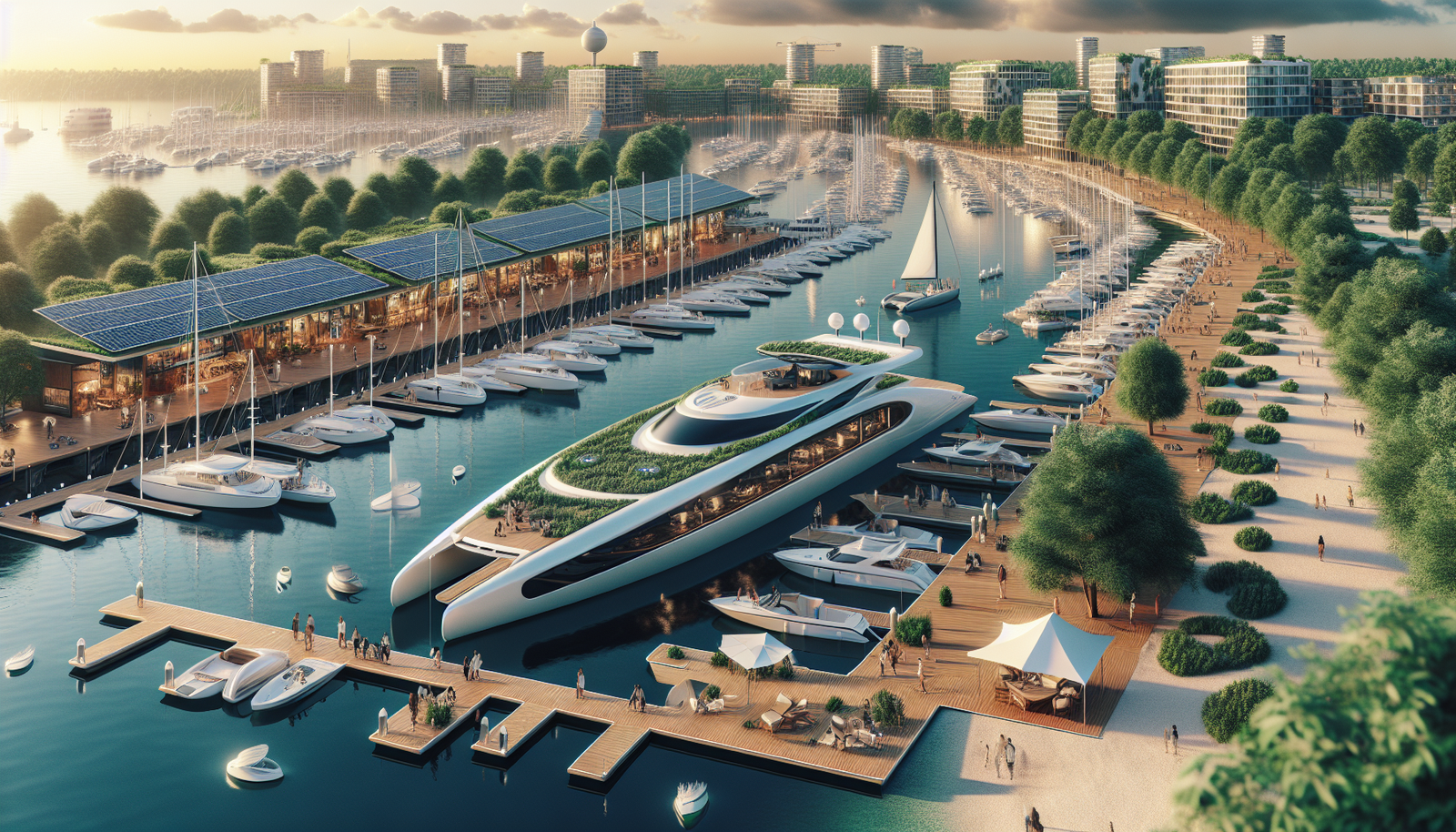Imagine a perfect day out on the boat, the sun gleaming off the water, the gentle hum of your eco-friendly boat motor, and all around you a well-maintained, sustainable boating infrastructure that works in harmony with nature. Whether you’re a casual boater or an enthusiast, there’s something deeply satisfying about knowing that your pastime isn’t harming the environment. “Eco-Friendly Boating Infrastructure and Facilities” is the definitive guide that helps you better understand the new wave of green boating solutions available today. From innovative boat designs to high-tech marina facilities, it engages you with modern, sustainable practices that will revolutionize the way you think about water recreation.
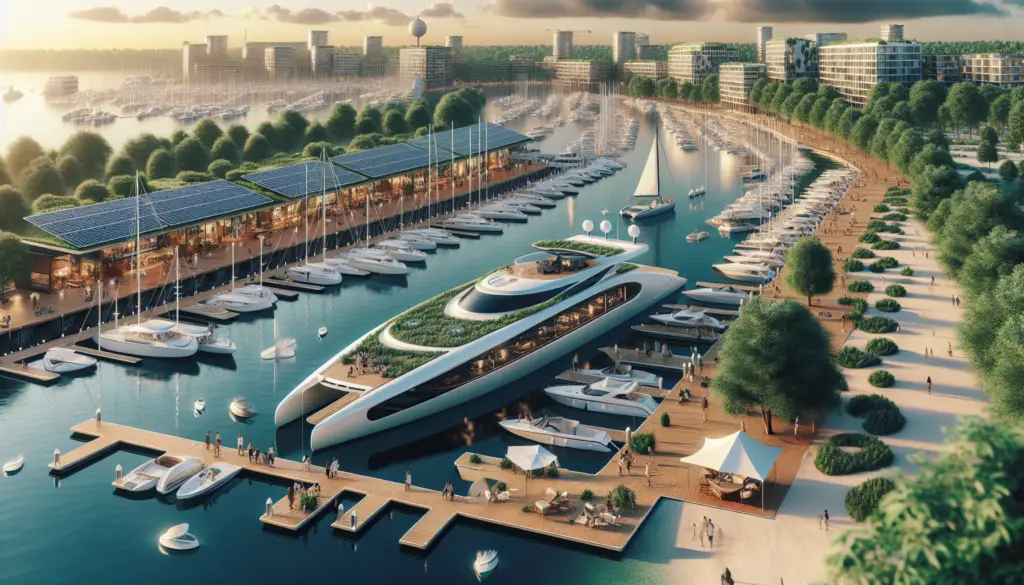
Understanding Eco-friendly Boating
Let’s talk about eco-friendly boating. As the name implies, eco-friendly boating takes a traditional leisurely pastime and injects it with a healthy dose of environmental consciousness. The key values revolve around reducing carbon footprints, preventing water pollution, and preserving aquatic ecosystems.
What is Eco-friendly Boating
Eco-friendly boating is essentially boating that is mindful of the environment. From using sustainable materials in boat construction and renewable energy for operations to following green practices on the water – every aspect is designed to minimize adverse environmental impact. But it’s not just about boating alone. The entire infrastructure – docks, marinas, and facilities, play a massive role in promoting eco-friendly boating.
Why is Eco-friendly Boating Important
You might wonder, why all this fuss about eco-friendly boating? Well, the importance lies in how significantly it can minimize our environmental impact. Traditional boating practices contribute to water contamination, air pollution, and degradation of aquatic ecosystems. With eco-friendly boating, we can enjoy our time on the water responsibly while lessening these detrimental impacts.
The Impact of Boating on the Environment
Boating, when not managed sustainably, can have several negative impacts on the environment. From fuel spills and engine emissions polluting the air and water, destruction of marine habitats due to improper anchoring, to noise pollution; the list is significant. The urgency is real and immediate, and eco-friendly boating can provide much-needed solutions.
Key Components of Eco-Friendly Boating Infrastructure
For boating to go green, the infrastructure needs to lead the way. How boats are built, where they are housed, and how energy needs are met, all these factors contributes in a big way to achieving eco-friendliness.
Environmentally Friendly Materials
When it comes to boat building, the materials used play a pivotal role. The focus is on moving towards using renewable, recycled, and non-toxic materials, lessening the environmental footprint at the very inception of a boat’s life.
Sustainable Construction Methods
Eco-friendly construction methods can contribute significantly to reducing environmental harm. By minimizing waste during the building process and using sustainable techniques like bio-composite materials and non-toxic antifouling paints, we can drastically change the environmental impact of a vessel.
Clean Energy Sources
Clean energy is the way forward, and the boating industry is quickly catching up. Technologies like solar panels, wind turbines, electric propulsion systems, and hydrogen fuel cells are powering up boats cleaner way, reducing reliance on fossil fuels.
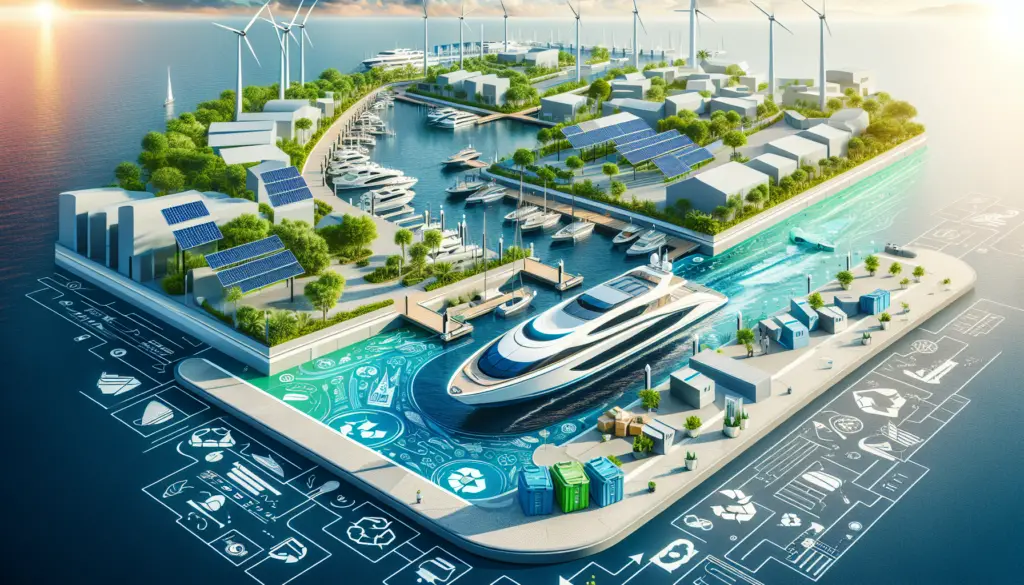
Eco-Friendly Dock Construction
The sustainability of docks is crucial in minimizing the harmful aesthetic and environmental impacts they can otherwise have on shorelines and aquatic habitats.
Using Renewable and Recycled Materials
Docks can be built using renewable or recycled materials, decreasing the need for extraction of new resources. Wood from sustainably managed forests, recycled plastic or composite materials can be used, expecting longer life spans compared to traditional materials.
Reducing Impact on Aquatic Life
The dock should be designed in a way to limit its impact on local aquatic life. Features like grating in place of solid surfaces can allow light to penetrate and support photosynthesis, helping to preserve the local ecosystem.
Prevention of Erosion and Runoff
The construction and existence of docks should work towards preventing shoreline erosion and controlling runoff. This can be achieved by incorporating features like vegetated buffers and employing natural-looking, sloping designs.
Sustainable Marina Design
A marina – the home to boats must be designed keeping sustainability in mind.
Maximizing Efficiency of Space
Efficient use of space can decrease the overall environmental impact of a marina. This includes considerations for boat storage density, land usage, and the effective integration of necessary services and facilities.
Incorporating Green Energy Sources
Green energy sources in marinas can power up the entire facility while reducing carbon emissions drastically. Solar panels, wind turbines, and other renewable energy technologies can be incorporated for this purpose.
Minimizing Waste and Pollution
Waste management and pollution control are critical aspects of a sustainable marina. Initiatives like providing recycling facilities, on-site sewage pump-out stations, and implementing rules for waste disposal can significantly reduce environmental contamination.
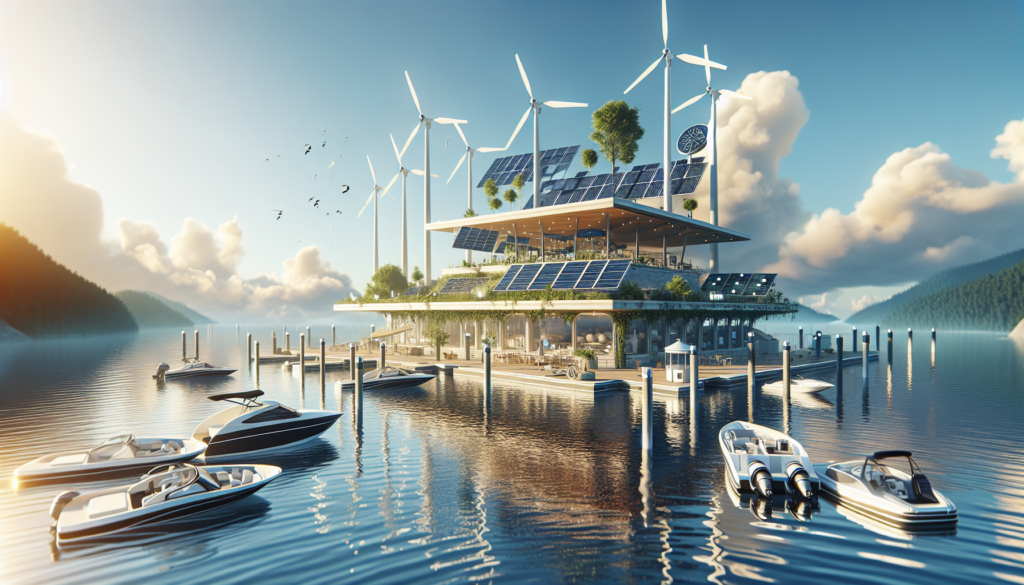
Use of Renewable Energy Sources
Renewable energy, with its immense potential, can significantly contribute to the green boating revolution.
Solar Power in Boating Infrastructure
Solar power can turn boats and marinas into self-reliant entities. With solar panels installed, your boat or marina could generate its own power, reducing reliance on grid electricity or diesel generators.
Wind Power for Dock and Marina Use
Wind turbines can be a feasible solution for remote marinas or for use in windy locations. Small, efficient wind turbines can complement solar installations providing power during low sunlight hours.
The Role of Tidal and Wave Energy
Tidal and wave energy technologies are also beginning to find their place in boating infrastructure. While still at a nascent stage, these renewable energy sources harness the motion of ocean currents to generate power.
Water Quality and Waste Management
The overall health of our water bodies can be directly connected to the management of water quality and waste.
Keeping Water Clean Around Marinas
Maintaining clean waters around marinas is critical to the survival of marine species. Regular water quality checks, handling boat sewage correctly, and enforcing no-dumping policies can work wonders.
Proper Disposal of Boat Waste
Boats can generate different types of waste – from sewage to oil. Proper management systems must be in place in marinas to encourage boaters to dispose of their waste responsibly.
Recycling Facilities at Marinas and Docks
Providing ample recycling facilities can greatly increase the chances of waste getting disposed of properly. Bins for different materials and informational signs can guide people to separate their waste, facilitating recycling.
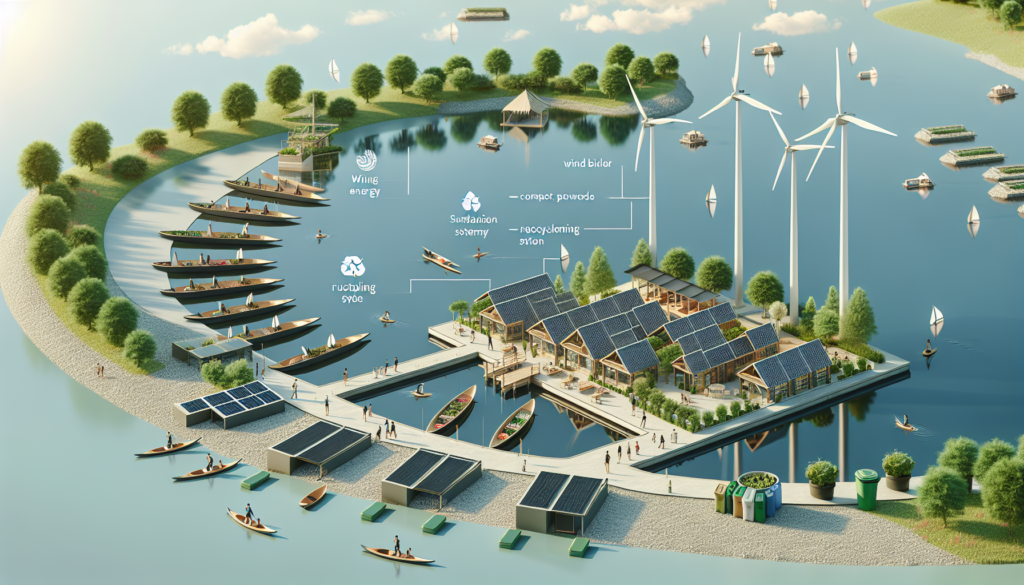
Eco-Friendly Boat Operations
The operations of a boat can contribute significantly to its environmental footprint.
Fuel-Efficient Engines for Boats
Switching to more fuel-efficient engines, ones that comply with emission standards, can significantly cut down on air pollution from boats.
Maintenance to Reduce Pollution
Regular maintenance of boats is vital to keep them from leaking oil or fuel into the water. Also, using eco-friendly cleaning products can prevent harmful chemical runoffs.
Electric and Hybrid Boats
Electric and hybrid boats are an exciting development on the green boating front. With zero or very low emissions, these boats can change our relationship with marine travel, making it a truly green experience.
Education and Policy for Eco-Friendly Boating
Education and policy enforcement play a key role in fostering eco-friendly boating practices.
Boater Education Programs
Through tailored education programs, boaters can learn about their roles in protecting the aquatic environment. These programs could focus on efficient boating practices, the importance of maintenance, and proper waste disposal techniques.
Regulations Promoting Sustainable Boating
Government and international regulations should promote sustainable boating through strict emission standards, waste disposal rules, and promoting the use of clean technologies.
Role of Government and NGOs
Government bodies and NGOs have a key role to play in driving innovation and setting standards for green boating. Through funding, regulation, and initiatives, these organizations can expedite the shift towards eco-friendly boating world.
Challenges and Solutions in Eco-Friendly Boating
Like any transition to sustainability, there exist specific challenges in eco-friendly boating, but we do have solutions.
Current Obstacles to Green Boating
Current obstacles involve a lack of public awareness, high upfront costs of green technologies, and need for infrastructural upgrades.
Emerging Technologies for Greener Boating
Emerging technologies like advanced battery systems, fuel cells, biofuels, and environmentally-friendly materials are paving the way for a greener boating future.
Case Studies of Successful Eco-Friendly Boating Initiatives
There are numerous case studies of successful eco-friendly boating initiatives around the globe, providing a roadmap for others to follow. From marinas going carbon-neutral to regions enforcing strict emission standards, the momentum is growing.
Future of Eco-Friendly Boating Infrastructure
As we look towards the future of green boating, exciting prospects emerge.
Predictions for Future Green Boating Technologies
With rapid technological advancements, we can expect boats to be increasingly powered by clean, renewable sources like solar, wind, and hydrogen. Automated waste management systems and smart marinas could also be on the horizon.
Strategies for Adoption of Eco-Friendly Practices
Adopting eco-friendly practices will require a multi-pronged approach – education, policy enforcement, infrastructure upgrades, affordable green technologies, and fostering a social value for environmental sustainability.
Long-term Impacts of Eco-Friendly Boating
The long-term impacts of eco-friendly boating can be truly transformative, leading to cleaner water bodies, healthier aquatic ecosystems, and a sustainable way for us to enjoy our time on the water. Indeed, eco-friendly boating is not just an aspiration – it is an exciting reality that is fast taking shape.

